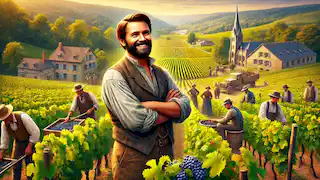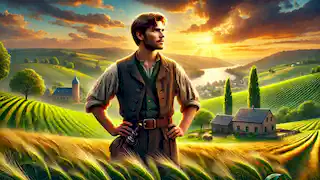The Rhine River flowed with an unbroken rhythm, carrying whispers of ancient lore and modern ambitions across the fertile landscapes of western Germany. In this region of green meadows and jagged hills, the story of *Drang nach Westen*—a deep-rooted cultural and territorial movement—was born. This was not merely a tale of geographic expansion but a tapestry of dreams, sacrifices, and the pursuit of identity.
In the late 19th century, as Germany sought to carve a place in the evolving political and economic landscape of Europe, individuals like Wilhelm Braun emerged as symbols of this westward drive. Wilhelm's journey was not just the migration of one man but the echo of an entire nation's aspirations. The year was 1884, and the village of Eichenfeld in the Rhineland bustled with activity as spring painted the land in hues of green. Wilhelm Braun, a wiry young man with sharp blue eyes, toiled in the fields alongside his father, Johann. The Braun family had tilled this soil for generations, their modest farm a testament to resilience and tradition. “Wilhelm,” Johann called, his voice roughened by years of shouting over the clamor of farm work, “you’ll never find a better life than what’s here under your feet.” Wilhelm paused, gripping the wooden handle of his plow. The Rhine shimmered in the distance, a symbol of constancy, yet also of escape. “But what if there’s more out there?” Wilhelm ventured. His father snorted. “Dreams don’t sow fields or harvest grain.” Despite Johann’s dismissal, Wilhelm’s thoughts often wandered westward. Stories of fertile lands, burgeoning industries, and opportunities for a better life reached even their quiet village. It wasn’t just ambition that drove him—it was the lure of freedom, of breaking free from the constraints of ancestral expectations. At the dinner table that evening, Wilhelm broached the topic with his family. Greta, his younger sister, looked at him with wide eyes, while their mother, Elise, froze mid-bite. “Leave Eichenfeld?” Elise whispered, her voice tinged with fear. “This is your home.” Wilhelm met her gaze steadily. “Home will always be here, but I need to see what lies beyond.” By summer’s end, Wilhelm stood on the platform of the Koblenz train station, a small suitcase in one hand and Greta’s drawing of their farmhouse tucked into his jacket. The steam engine loomed like a metallic beast, hissing and growling, ready to devour miles of track. “Promise me you’ll write,” Greta said, clutching his arm. “I will,” Wilhelm replied, though his voice wavered. Their mother’s embrace had been tearful, and his father had offered a brusque handshake, muttering something about “chasing illusions.” Yet, as the train pulled away, Wilhelm felt a mix of trepidation and exhilaration. The journey westward was a revelation. Small villages gave way to sprawling cities, and the landscape shifted from the familiar contours of the Rhineland to the rolling hills of Alsace. Wilhelm’s first destination was Strasbourg, a city where German and French influences collided. Strasbourg greeted him with its Gothic cathedral, cobblestone streets, and a bustling marketplace filled with voices in multiple languages. Wilhelm found work in a vineyard on the outskirts, owned by Henri Moreau, a gruff but kind Frenchman. “You’ll work hard here,” Henri said on Wilhelm’s first day, handing him pruning shears. “The vines demand respect.” Over the next year, Wilhelm learned the delicate art of winemaking. Henri’s vineyard was a microcosm of the larger cultural tensions in the region—German settlers seeking opportunities, and French locals wary of their presence. “Why did you come west?” Henri asked one evening, pouring Wilhelm a glass of Riesling. Wilhelm sipped the wine thoughtfully. “I want more than the life my family’s farm could offer. Freedom, perhaps.” Henri chuckled. “The west offers freedom, but only to those willing to fight for it.” By 1886, Wilhelm had saved enough money to purchase a small plot of land in Lorraine, a region caught in the cultural and political tug-of-war between France and Germany. The land was overgrown and rocky, but to Wilhelm, it was a blank slate—a chance to build something entirely his own. Days began before dawn and ended long after sunset. Wilhelm cleared the fields by hand, built a modest farmhouse, and planted the first rows of crops. It was backbreaking work, but he relished the freedom of shaping his destiny. His letters home were filled with cautious optimism. Greta’s replies became his lifeline, filled with stories of home and encouragement. “Father says you’ll come crawling back,” one letter read, “but I know you won’t. You’ve always been stubborn, Wilhelm. Keep going.” The local German community in Lorraine welcomed Wilhelm, offering advice and support. Yet, tensions with the French locals simmered just beneath the surface. Disputes over land and water rights were common, and the language barrier often turned minor misunderstandings into heated arguments. One such dispute occurred when Wilhelm’s neighbor, a French farmer named Jacques, accused him of diverting a stream. Wilhelm, armed with a rudimentary knowledge of French, tried to explain his innocence, but the confrontation escalated. “Stay on your side, German,” Jacques spat, storming away. That night, Wilhelm sat by the fireplace, turning Greta’s drawing over in his hands. He missed the simplicity of Eichenfeld, but retreat was not an option. By 1890, Wilhelm’s farm had become a modest success. He had married Amélie, a French woman with a sharp wit and an unyielding determination that matched his own. Together, they worked tirelessly to expand their holdings, but the cultural divide in Lorraine was growing more volatile. One crisp autumn evening, Wilhelm returned from a town council meeting to find his barn engulfed in flames. He raced to douse the fire, joined by his neighbors—both German and French—but the damage was severe. “Who did this?” Wilhelm demanded, his voice raw with anger. Amélie placed a hand on his arm. “You know who.” A group of French nationalists had been targeting German settlers, accusing them of eroding the region’s identity. The fire was a stark reminder that success came at a cost. “We can’t live like this,” Amélie said later, her voice trembling. Wilhelm stared into the embers of the ruined barn. “Then we’ll change it.” The fire marked a turning point for Wilhelm. He began to advocate for dialogue and cooperation between the German and French communities, attending town meetings and mediating disputes. His efforts earned him respect on both sides, though not without resistance. One particularly tense meeting saw Wilhelm face off against Jacques, the neighbor who had once called him a thief. “This land belongs to all of us,” Wilhelm argued, his voice steady. “If we don’t work together, none of us will thrive.” Jacques regarded him for a long moment before nodding. It was a small victory, but a victory nonetheless. Over the next decade, Wilhelm’s farm became a symbol of unity. He and Amélie raised their children to embrace both German and French traditions, instilling in them the values of hard work and mutual respect. By the early 1900s, Wilhelm’s vineyard was renowned throughout Lorraine, its wine a blend of German precision and French artistry. Standing on his land one evening, Wilhelm reflected on his journey. “I chased shadows,” he murmured, recalling his father’s words. “And I found light.” Wilhelm Braun’s story did not end with him. His descendants carried on his legacy, preserving the vineyard and the ideals he had fought to uphold. The *Drang nach Westen* was not merely a movement of borders but a testament to the human spirit’s capacity for growth and reconciliation. As the Rhine continued its eternal journey, so too did the tale of Wilhelm Braun—a story of struggle, triumph, and the enduring power of unity.The Rhine and Its People
A Train Westward
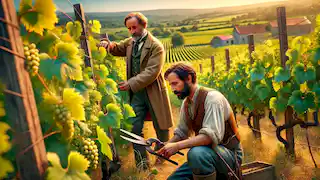
The Promise of Lorraine
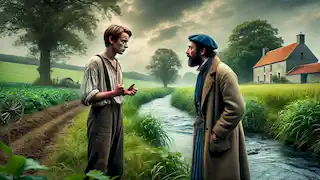
Fire and Resolve
Building Bridges
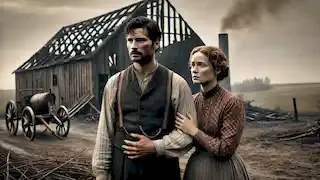
Epilogue: A Legacy of Unity
